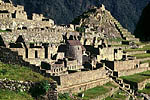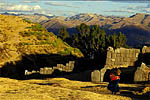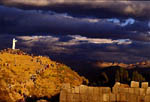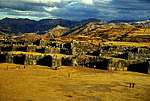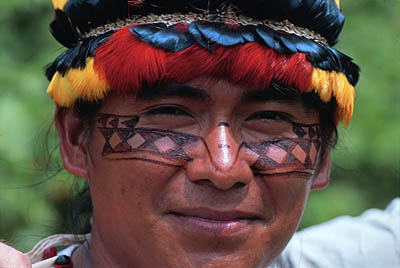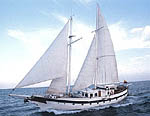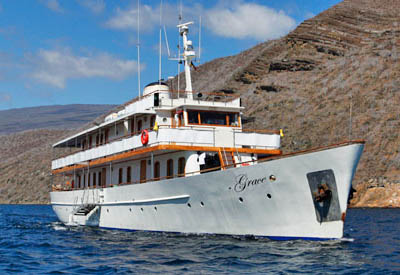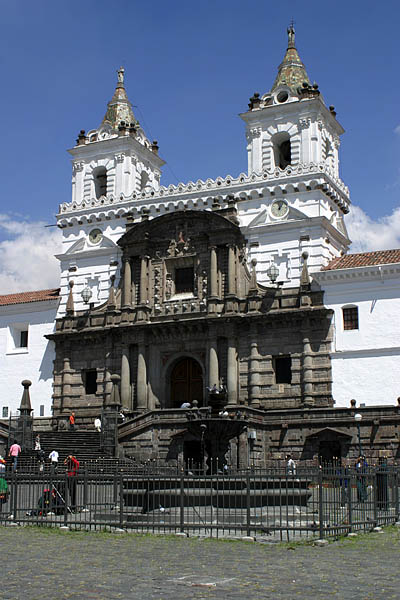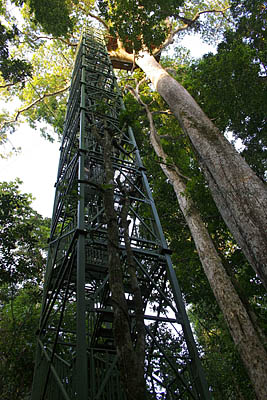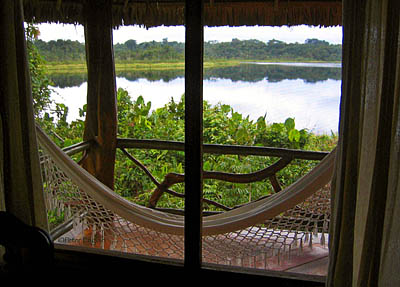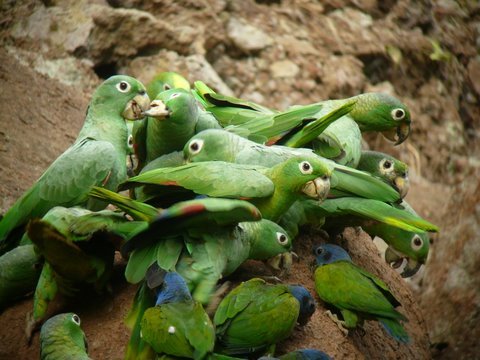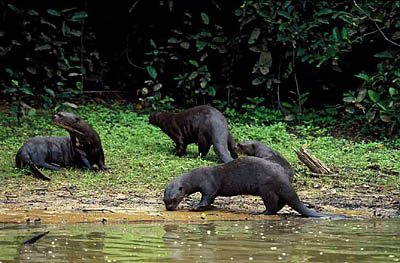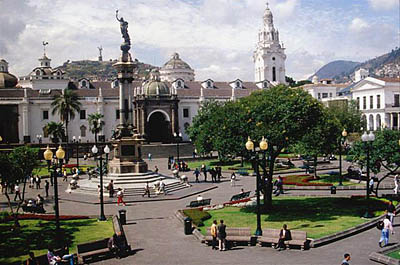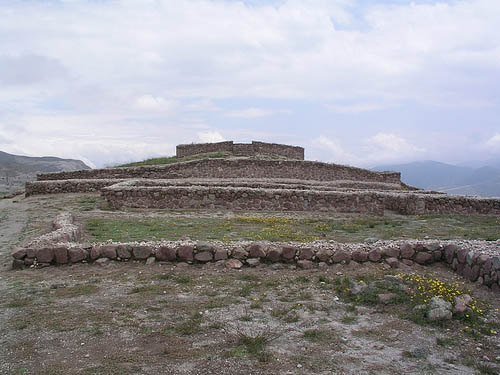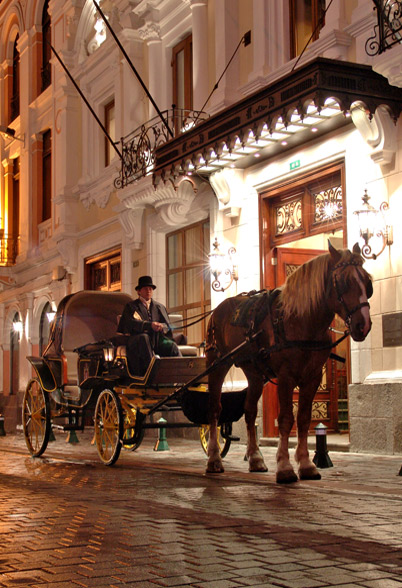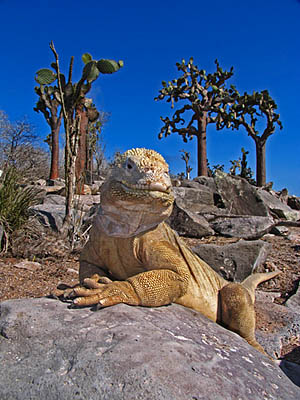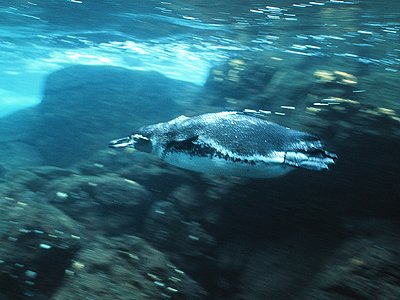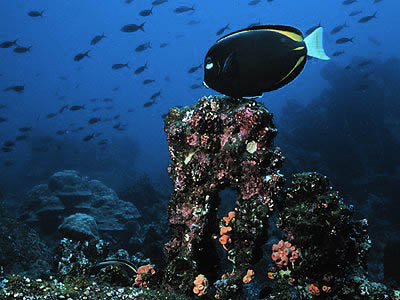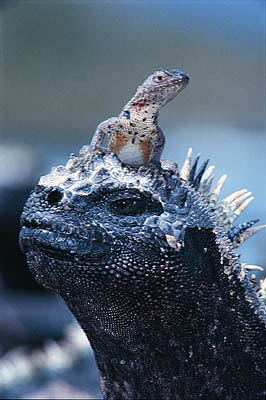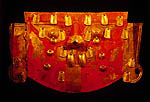![]()
Legacy of the Incas
Machu Picchu Luxury Tours
Peru:
Machu Picchu - Lake Titicaca
(11 days/10 nights)
Machu Picchu Luxury Tours
Peru:
Machu Picchu - Lake Titicaca
(12 days/11 nights)
Empire of the Sun
Machu Picchu Luxury Tours
Peru:
Machu Picchu - Lake Titicaca
(14 days/13 nights)
Ancient Civilizations of Peru
Machu Picchu Luxury Tours
Peru:
Colca Canyon - Machu Picchu
Lake Titicaca
(16 days/15 nights)
Archaeological & Ecological
Treasures
Machu Picchu Luxury Tours
Peru & Ecuador:
Galapagos - Machu Picchu
Lake Titicaca (or Amazon)
(18 days/17 nights)
Grand Tour of the Inca Empire
Machu Picchu Luxury Tours
Peru:
Colca Canyon - Amazon
Machu Picchu- Lake Titicaca
(22 days/21 nights)
Ancient & Colonial Capitals
Machu Picchu Luxury Tours
Peru:
Machu Picchu
(10 days/9 nights)
Inca Trail to Machu Picchu
Machu Picchu Luxury Tours
Peru:
Machu Picchu
(13 days/12 nights)
Machu Picchu & Galapagos
Machu Picchu Luxury Tours
Peru & Ecuador:
Machu Picchu - Galapagos
(15 days/14 nights)
Galapagos & Machu Picchus
Machu Picchu Luxury Tours
Ecuador & Peru:
Galapagos - Machu Picchu
(18 days/17 nights)
Enchanted Isles of the Galapagos
Machu Picchu Luxury Tours
Ecuador:
Galapagos
(11 days/10 nights)
Galapagos & the Kingdom of Quito
Machu Picchu Luxury Tours
Ecuador:
Galapagos - Andes
(16 days/15 nights)
Galapagos & the Amazon
Machu Picchu Luxury Tours
Ecuador:
Galapagos - Amazon
(16 days/15 nights)
Historic Haciendas of the Andes
Machu Picchu Luxury Tours
Ecuador:
Cotopaxi - Antisana - Otavalo
(7 days/6 nights)
© 2013 Inka's Empire Corporation.
All rights reserved.
![]()
Luxury Galapagos Cruises
Achuar guide, Kapawi Ecological Reserve, Ecuador.
Photo: Kapawi Lodge. Luxury Galapagos Cruises.
The awesome opportunity to explore one of the world's last pristine landscapes...
-- Kimberly Fay, LuxuryLink.com
Land & Cruise Price (16 days/15 nights)
Imperial US$ 12,285 per person
The prices shown include a Premium Stateroom aboard the luxurious yacht Grace. Our tours also are available with other yachts or with a 4-night Galapagos cruise, instead of 7 nights. Please select a yacht to view details about each vessel and its itinerary.
When considering a Galapagos cruise, note that the islands are distinct in their flora and fauna. Certain islands provide a greater or unique opportunity for observing certain species. Thus, landings on more islands reveal more species and, importantly, the amazingly different adaptations each species has made to its own insular world. Accordingly, a 7-night cruise is preferable. It also offers a greater choice of luxury vessels.
The land and cruise price includes escorted transfers; private excursions with a native guide and a naturalist at the Napo Wildlife Center, private excursions with a professional guide and chauffeur in Quito and semi-private excursions with a certified naturalist on the Galapagos Islands; entrance fees; selected category of accommodations; gourmet cuisine (see details); all intra-tour transportation except the Quito-Galapagos-Quito air flights; and travel insurance for guests through the age of 59 years (over that age, there is a supplementary fee). All prices are per person based on two people sharing a guest room. For a detailed description of our services, see Opulent Itineraries.
Map
Hotels
12 Nights
Galapagos Cruises
What You Could Add in Ecuador
Intra-Tour Flights & Fares
Air fares are in addition to the land price.
Quito - Galapagos - Quito & Quito - Coca - Quito: US$ 575 per person
Select a Yacht
Luxury Galapagos Cruises
Cormorant
Evolution
Grace
Isabela II
Ocean Spray
Pinta
Grace: Elegance, Beauty & Prestige...
In 1951, this motor yacht was acquired by Aristotle Onassis, who later gave her as a wedding gift to Prince Rainier and Princess Grace of Monaco. It was onboard this vessel that Prince Rainier and Princess Grace spent their honeymoon getaway. She has been rechristened with a name that takes her years' back into her history, to the very best of her times. Named after her late owner, Her Serene Highness Princess Grace of Monaco, the name is a representation of her elegance, beauty and prestige. Reservations for The Grace Experience, a seven-night journey in one of her nine spacious cabins, are now being accepted. We invite you to download a brochure and a deck plan.
Grace, Galapagos Islands.
Photo: Quasar Expeditions. Luxury Galapagos Cruises.
From the Amazon Rainforest to the Galapagos Islands, you will explore the magnificent ecological wonders of Ecuador. Upon arrival in Quito, you will be escorted to the palatial Casa Gangotena, then dine on fusion cuisine at Zazu.
A morning flight over the Andes to Coca, in the Amazon Rainforest, begins your four-night jungle expedition. From the airfield, take a riverboat down the Napo River and a dugout canoe up a blackwater creek to the lake and lodge. Located within the Yasuní National Park, the Napo Wildlife Center was established by a conservation group to guard the 52,000-acre Añangu Reserve. It protects 562 bird species (including Scarlet Macaws and Mealy Amazon Parrots), Giant Otters, Jaguars, Black Caimans, Harpy Eagles, Crested Eagles, Common Woolly Monkeys, Black Spider Monkeys and nine other primates. Your rainforest excursions will be led by a native Añangu guide, an expert on the rainforest's secrets, and a naturalist, knowledgeable in tropical forest biology. After exploring the wildlife treasures, including the parrot clay licks, return by canoe, riverboat and plane to Quito.
In Ecuador's capital, founded in 1534, walk along the cobblestone streets through centuries-old parks and plazas to churches filled with gold. Contemplate Gothic, Baroque, Moorish and Neo-Classical architecture, all blended with the mestizo sentiment, and imagine you've gone back in time to the astonishing colonial world. In the evening, take a horse-drawn carriage past the beautifully illuminated facades of the Spanish monuments, and savor vanguard Mediterranean cuisine at Theatrum.
A flight the next morning takes you from the peaks of the Andes to the Galapagos Islands. While yachting this extraordinary archipelago with a naturalist, go ashore amid volcanic landscapes, hike among Marine Iguanas and lava lizards, and have the rare opportunity of snorkeling among penguins and marine tortoises. On these enchanted isles, each with its unique wildlife, you can compare the adaptations of the species to their differing environments that inspired Charles Darwin's theory of evolution.
Returning for your last night in Quito, experience the finest in Criollo cuisine at Astrid & Gastón. For an appreciation of the volcanic splendor, native cultures and Spanish colonial life of the Andes, consider adding one of our luxury hacienda tours.
What Luxury Link has to say about Galapagos & the Amazon.
What You Could Add: Galapagos Safari Camp.
A true return to the golden age of exploration...
Grace Yacht Overview, Galapagos Islands.
Video: Quasar Expeditions. Luxury Galapagos Cruises.
Highlights
Quito
Day 1: Flight to Quito, Ecuador. International arrival in the afternoon or evening, reception and transfer to your hotel. Dine at Zazu. Overnight in the Casa Gangotena -- Plaza View Room.
Napo Wildlife Center
Day 2: Quito - Coca - Napo Wildlife Center. Transfer to the airport. Flight to Coca. Arrival at the airfield and reception. Riverboat down the Napo River and dugout canoe up a blackwater creek to the lake and lodge. Overnight in the Napo Wildlife Center.
Days 3, 4 & 5: Napo Wildlife Center. Jungle excursions. Overnight in the Napo Wildlife Center.
Quito
Day 6: Napo Wildlife Center - Quito. Canoe to the Napo River and riverboat to the Coca airfield. Flight to Quito. Arrival, reception and transfer to your hotel. Dinner at Alma. Overnight in the Casa Gangotena -- Plaza View Room.
Day 7: Quito. This morning, drive to the top of El Panecillo. Its summit overlooks Old Quito. Begin your walking tour of the colonial quarter, highlighted by La Plaza de la Independencia, the Cathedral, La Compañia de Jesús, La Iglesia de San Francisco and La Iglesia y Convento de la Merced. At the City Museum, see what daily life was like in colonial Quito.
Lunch at El Crater, inside the crater of the Pululahua Volcano. Our afternoon destination is Rumicucho, a late 15th century Inca fortress, observatory and temple of the sun. It was built near the equator, which the Incas called Intiñan (Path of the Sun). Before returning to Quito, go to the equator, where you can stand with one foot in the southern hemisphere and the other in the northern hemisphere.
As an alternative, you may choose an afternoon excursion to the Central Bank Museum.
This afternoon, a lunch at Café Tianguez. To complete your insight into the country's archaeology, history and cultures; investigate Ecuador's ancient past in the galleries of the Central Bank Museum.
This evening, return to El Panecillo for a panorama of the beautifully illuminated colonial quarter. Though not of colonial vintage, the neo-Gothic La Basílica is the place to see bizarre and fascinating gargoyles. Admire the night view of the Spanish monuments along Calle de las Siete Cruces, on the way to La Plaza de la Independencia, where you will board a horse-drawn carriage for a romantic ride through the narrow streets of Old Quito. Arrive at Theatrum to savor vanguard Mediterranean cuisine. Afterward, return to your hotel. Overnight in the Casa Gangotena -- Plaza View Room.
Galapagos
Day 8: Quito - Galapagos Cruise. Transfer to the airport. Flight to the Galapagos. Entrance into the National Park, reception and transfer to your yacht. Afternoon island landing and excursion with a naturalist. Back on board. Guides' briefing on the next day's activities. Overnight on the Grace.
Days 9 - 14: Galapagos Cruise. Morning and afternoon island landings and excursions with a naturalist. Back on board. Guides' briefing on the next day's activities. Overnight on the Grace.
Quito
Day 15: Galapagos Cruise - Quito. Morning island landing and excursion with a naturalist. Transfer to the airport. Flight to Quito. Reception and transfer to your hotel. Dinner at Astrid & Gastón. Overnight in the Casa Gangotena -- Plaza View Room.
Home
Day 16: Quito - Home. Transfer to the airport for your flight home.
Exceptions to the itinerary:
The Galapagos cruise itinerary described and illustrated below is typical but varies by yacht. Therefore, it should be used only as a guide for learning about the different islands and their wildlife.
Details
The 1535 La Iglesia
de San Francisco, Quito, Ecuador.
Photo: David Bate. Luxury Galapagos Cruises.
Day 1: Flight to Quito, Ecuador
International arrival this afternoon or evening in Quito. Reception and escorted transfer to the palatial Casa Gangotena. Dine at Zazu, where chef Alexander Laud creates a fusion of South American and international cuisine. Overnight in the Casa Gangotena.
White-fronted Capuchin Monkey, Napo Wildlife Center, Ecuador.
Photo: Peter English. Luxury Galapagos Cruises.
Cobalt-winged parakeets were already clustering on trees in groups of 20s and 30s
like lush bunches of grapes as we settled into the blind.
-- Connie Rogers, The New York Times, August 1, 2004
Napo Wildlife Center
Location: Añangu Reserve, Yasuní National Park, Ecuador. Reserve size: 52,000 acres within the 2.5-million-acre Yasuní National Park. Wildlife it protects: 562 bird species (including Scarlet Macaws and Mealy Amazon Parrots), Giant Otters, Jaguars, Black Caimans, Harpy Eagles, Crested Eagles, Common Woolly Monkeys, Black Spider Monkeys and nine other primates.
Adventure for the rest of us
The Amazon Basin is famous for its wildlife, but not for its creature comforts. With the Napo Wildlife Center, you get the best of both worlds.
Here, you can see thousands of parrots at the two, nearby parrot clay licks, Giant Otters in the lake and streams, 11 species of monkeys in the trees and over 550 species of birds in the forest. When your day is done, you can take a hot shower, sit on your private porch overlooking the lake, have a cold beer from the bar and enjoy a healthy international dinner. This is the jungle in style.
The 125-foot-tall canopy tower, Napo Wildlife Center, Ecuador.
Photo: Peter English. Luxury Galapagos Cruises.
From start to finish, the Napo Wildlife Center combines creature comforts with incredible wildlife. Bilingual guides explain the intricacies of the rainforest while the staff works to make your stay the trip of a lifetime. And why wouldn't they? They are not only your staff but also major stockholders of the lodge!
In addition to being the best wildlife lodge in the Amazon of Ecuador, the Napo Wildlife Center also conserves 82 square miles of pristine rainforest in its private reserve, based on a conservation partnership with the local community.
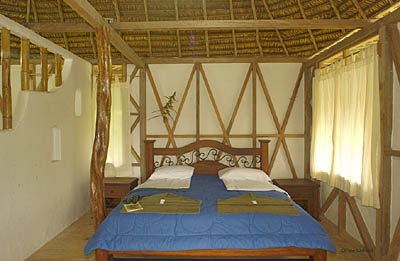
Partial view of a cabaña
interior, Napo Wildlife Center, Ecuador.
Photo: Pete Oxford. Luxury Galapagos Cruises.
Each chair... had been ferried downriver precariously balanced on a dugout...
-- Connie Rogers, The New York Times, August 1, 2004
Lodge highlights
The huge rooms at the Napo Wildlife Center are the most spacious and comfortable in the rainforest. Each meticulously clean room includes:
- 1 king-sized bed and 1 twin bed
- Pivate bathroom with plenty of on-demand hot water
- Private porch overlooking the lake
- 24-hour electricity for bright lighting and plenty of outlets for recharging batteries (120v)
- Ceiling fans and secure screens for bug-free ventilaton
The view from a private cabaña, Napo Wildlife Center, Ecuador.
Photo: Peter English. Luxury Galapagos Cruises.
The dining facility is covered by an enormous thatched roof and has an adjacent observation tower. Inside the facility is a modern kitchen with state-of-the-art water filtration, a large area for dining and relaxing, and a well-stocked bar.
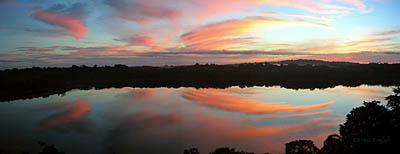
Another beautiful sunrise
from the dining hall tower, Napo Wildlife Center, Ecuador.
Photo: Peter English. Luxury Galapagos Cruises.
Behind us, the violet silhouette of the Andes stood out on the horizon
and in front... was the vast, seemingly virgin Amazon basin.
-- Connie Rogers, The New York Times, August 1, 2004
About the consevation project
The Napo Wildlife Center supports a unique, 82-square-mile (52,000-acre), private nature reserve on the northern edge of the Yasuní National Park. The reserve and associated lodge were created and built by the traditional Quichua Indian community of Añangu in partnership with the nonprofits Tropical Nature and EcoEcuador. Funding for this project came from charitable contributions to Tropical Nature.
The Napo Wildlife Center is the only lodge on the south bank of the Napo River, which harbors 30% more bird and animal species than the north bank. With parrot licks, Giant Otters, Woolly Monkeys, and ten other primates, Napo Wildlife Center is the finest wildlife destination in the Amazon of Ecuador.
A visit to the comfortable Napo Wildlife Center is an unforgettable experience that directly protects both the community's reserve and Yusuní National Park.
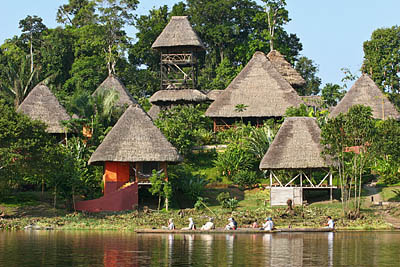
Heading out to explore
the lake, Napo Wildlife Center, Ecuador.
Photo: Peter English. Luxury Galapagos Cruises.
Napo Wildlife Center lies inside the two-and-a-half-million acre
Yasuní National Park... a Unesco Biosphere Reserve...
-- Connie Rogers, Feathers, Fur and Jungle Waters, The New York Times, August 1, 2004
Day 2: Quito - Coca - Napo Wildlife Center
Breakfast. To get to the Napo Wildlife Center, guests fly by jet from Quito to the town of Coca on the Napo River. After a short drive to the dock, we board a large, motorized, covered canoe for a two-hour trip downriver. Upon arriving at the entrance to the Napo Wildlife Center Reserve, we switch to smaller, dugout canoes and are paddled up the blackwater creek to the lake and lodge (no motorized transport is allowed on the creek or lake so that wildlife isn't disturbed).
This paddle can take anywhere from one to three hours, as on the creek guests might see Giant Otters, potoos, kingfishers, Hoatzins, jacamars, hawks, and monkeys. We eat lunch en route and arrive at the lodge by late afternoon. Overnight in the Napo Wildlife Center.
Parrots at the clay lick, Napo Wildlife Center, Ecuador.
Photo: Marcia Strouss. Luxury Galapagos Cruises.
Suddenly... hundreds of birds rose in the air and descended on the clay lick
in a dazzling rain of turquoise, red, yellow, orange and green.
-- Connie Rogers, The New York Times, August 1, 2004
Days 3, 4 & 5: Napo Wildlife Center
Breakfast. Visitors will be led by a native Añangu guide, an expert on the rainforest's secrets, and a naturalist, knowledgeable in tropical forest biology. Both of your guides, with their unmatchable enthusiasm, will create informative and enjoyable excursions every day, each tailored to take advantage of the peaks of animal activity and weather conditions. Some outings will be before dawn or at sunrise to maximize wildlife observation, and others in the afternoon or at night.
Giant Otters, Napo Wildlife Center, Ecuador.
Photo: Luis Claudio Marigo. Luxury Galapagos Cruises.
At the lake's entrance, six giant otters exploded out of the water,
bouncing up and down, screeching and barking, like guard dogs...
-- Connie Rogers, The New York Times, August 1, 2004
Among the main attractions are the parrot clay licks. The two most accessible parrot clay licks in Ecuador are part of the Napo Wildlife Center reserve. We have constructed viewing blinds at each of these clay licks so that visitors can comfortably watch as hundred of parrots and parakeets come to eat the clay that aids in the digestion of their diet of unripe seeds and fruits. Parrots visit the clay licks at different times of day, so it is easy to visit both clay licks in a single outing.
Activity kicks off at the main lick between 7 to 8 in the morning and at the second lick after midday. Species include Mealy, Blue-headed, Yellow-crowned, Orange-winged and Orange-cheeked Parrots; Cobalt-winged, Dusky-headed and White-eyed Parakeets; and the occasional rarities, like Scarlet Shoulder Parrotlet and Scarlet Macaws. In the best weather conditions, at least 800 individuals and most species can be spotted, and on other days, in spite of the rain, one can still see a few dozen. You could make it a full-day excursion, visiting both blinds, equipped with a freshly-made box lunch, or a half-day, visiting the main lick and returning for lunch at the lodge. Overnight in the Napo Wildlife Center.
Birdwatching our way upstream, Napo Wildlife Center, Ecuador.
Photo: Peter English. Luxury Galapagos Cruises.
Day 6: Napo Wildlife Center - Coca - Quito
Breakfast. Dugout canoe down the blackwater creek to the Napo River and riverboat to the Coca airfield for the flight back to Quito. Arrival, reception and escorted transfer to your hotel. Dinner of creative cuisine by chef Miguel de Arregui at Alma. Overnight in the Casa Gangotena.
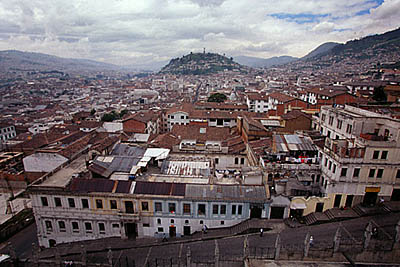
Colonial Quito with
El Panecillo in the distance, Ecuador.
Photo: Dan Heller. Luxury Galapagos Cruises.
Under the diadem of the Incas, Quito assumed a magnificence which it never saw before and has not displayed since. It was the worthy metropolis of a vast empire stretching from the equator to the desert of Atacama, and walled in by the grandest group of mountains in the world. On this lofty site, which amid the Alps would be buried in an avalanche of snow, but within the tropics enjoys an eternal spring, palaces more beautiful than the Alhambra were erected, glittering with the gold and emerald of the Andes. But all this splendor passed away with the sceptre of Atahuallpa...
-- James Orton, Andes and the Amazon, 1870
Day 7: Quito
Breakfast. Quito has the best-preserved historic district in South America. It is located on an active volcano, 9,300 feet above sea level in the Andes mountains. The city's origins date back to the first millennium, when the Quitu tribe occupied the area and eventually formed a commercial center. The Quitu were conquered by the Caras tribe, who founded the Kingdom of Quito about 980 AD. In 1462, the Incas conquered that kingdom and created a majestic capital for their northern empire. In 1533, Rumiñahui, an Inca war general, razed the city to prevent the Spaniards from taking it, thereby destroying any traces of the prehispanic metropolis. In 1534, the Spanish conquistadores invaded, and Francisco Pizarro founded San Francisco de Quito. Walking along its cobblestone streets through centuries-old parks and plazas to churches filled with gold, you will imagine you've gone back in time to the astonishing colonial world.
Source: Adapted from www.worldheritagesites.org.
La Plaza de la Independencia, Quito, Ecuador.
Photo: Mylene d'Auriol Stoessel. Luxury Galapagos Cruises.
This morning, drive to the top of El Panecillo. The significance of this hill dates back to Inca times, when it was known as Shungoloma ("hill of the heart") and used as a place to worship the sun. Its summit overlooks Old Quito and is crowned by a winged statue of the Virgin. Begin your walking tour of the colonial quarter at La Plaza de la Independencia, where the country's history was written. On one side is the Cathedral (1640), considered to be the oldest in South America. Down Calle de las Siete Cruces (Street of the Seven Crosses) is La Compañia de Jesús (1605), one of the great baroque masterpieces of the continent. Also in the baroque style is the oldest of South America's colonial churches, La Iglesia de San Francisco (1535). It was constructed over the Inca Palace of Atahualpa and decorated with images of the sun to lure in the native people. The Moorish style of La Iglesia y Convento de la Merced is most likely explained by artists seeking refuge in South America after the expulson of the Moors from Spain. Started in 1538, the church was rebuilt in 1737. At the City Museum, see what daily life was like in colonial Quito.
El Pucará de Rumicucho. Ecuador.
Photo: Erythren. Luxury Galapagos Cruises.
Lunch of Ecuadorian or international cuisine by chef Carlos Alvear at El Crater, inside the Pululahua Volcano. Our afternoon destination is Rumicucho, a late 15th century Inca fortress, observatory and temple of the sun. It was built near the equator, which the Incas called Intiñan (Path of the Sun). Rumicucho was strategically located to allow communication by smoke signals with the ceremonial center of Cochasqui, 9 miles to the east, and with Quito's El Panecillo and the Palace of Atahualpa, 17 miles to the south. Before returning to Quito, go to the equator, where you can stand with one foot in the southern hemisphere and the other in the northern hemisphere. Don't be fooled by the Equatorial Monument, which isn't in the true position.
As an alternative, you may choose an afternoon excursion to the Central Bank Museum.
This afternoon, a lunch of traditional Ecuadorian cuisine by chef Juan José Loaiza at Café Tianguez. To complete your insight into the country's archaeology, history and cultures; investigate Ecuador's ancient past in the pre-Inca, Inca and colonial galleries of the Central Bank Museum. The Incas believed that gold nuggets were the tears of the sun, and one of the galleries, the Golden Court, dazzles the visitor with the gold masks and figurines they fashioned to worship their deity.
Traditional horse-drawn carriage, Quito, Ecuador.
Photo: Hotel Plaza Grande. Luxury Galapagos Cruises.
This evening, return to El Panecillo for a panorama of the beautifully illuminated colonial quarter. Though not of colonial vintage, the neo-Gothic La Basílica is the place to see bizarre and fascinating gargoyles in the form of giant tortoises, iguanas, anteaters, monkeys, pumas, condors and other Ecuadorian fauna. Admire the night view of the Spanish monuments along Calle de las Siete Cruces, on the way to La Plaza de la Independencia, where you will board a horse-drawn carriage for a romantic ride through the narrow streets of Old Quito. Arrive at Theatrum to savor vanguard Mediterranean cuisine by chef Julio Jose Avendaño Ostolaza. Afterward, return to your hotel. Overnight in the Casa Gangotena.
Land iguana and opuntia cacti, Galapagos Islands.
Photo: Ron Dahlquist. Luxury Galapagos Cruises.
We seem to be brought somewhat near to that great fact
-- that mystery of mysteries --
the first appearance of new beings on this earth...
The natural history of these islands is eminently curious, and well deserves attention. Most of the organic productions are aboriginal creations, found nowhere else; there is even a difference between the inhabitants of the different islands; yet all show a marked relationship with those of America, though separated from that continent by an open space of ocean, between 500 and 600 miles in width. The archipelago is a little world within itself, or rather a satellite attached to America, whence it has derived a few stray colonists, and has received the general character of its indigenous productions. Considering the small size of the islands, we feel the more astonished at the number of their aboriginal beings, and at their confined range. Seeing every height crowned with its crater, and the boundaries of most of the lava-streams still distinct, we are led to believe that within a period geologically recent the unbroken ocean was here spread out. Hence, both in space and time, we seem to be brought somewhat near to that great fact -- that mystery of mysteries -- the first appearance of new beings on this earth.
-- Charles Darwin, Voyage of the Beagle, 1845
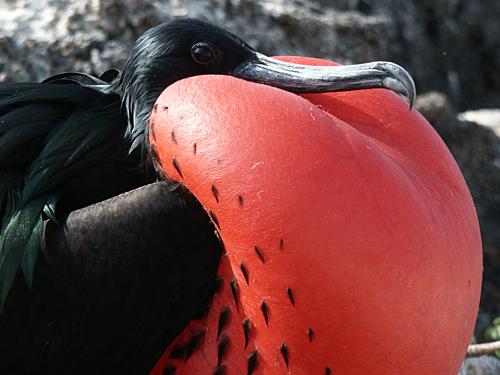
Male frigate bird displaying,
Galapagos Islands.
Photo: Marco Robalino. Luxury Galapagos Cruises.
From so simple a beginning endless forms most beautiful and most wonderful
have been, and are being evolved...
Thus, from the war of nature, from famine and death, the most exalted object which we are capable of conceiving, namely, the production of higher animals, directly follows. There is grandeur in this view of life, with its several powers, having been originally breathed by the Creator into a few forms or into one; and that, whilst this planet has gone cycling on according to the fixed law of gravity, from so simple a beginning endless forms most beautiful and most wonderful have been, and are being evolved.
-- Charles Darwin, On the Origin of Species by Means of Natural Selection, 1859
Sea turtle, Galapagos Islands.
Photo: Bonnie Pelnar. Luxury Galapagos Cruises.
Northern & Southern Islands
Day 8: Quito - Galapagos Cruise (San Cristóbal Island)
Breakfast. Early morning transfer to the airport for the flight to the Galapapagos Islands. San Cristóbal Island (558 sq. km.) is the fifth largest in the archipelago and the second most populated. The town of Puerto Baquerizo Moreno is the capital of the Galapagos Islands and its oldest settlement. Fauna include giant tortoises and red- blue- and masked- boobies. The native flora include candelabra cactus, palo santo (the "incense tree") and saltbrush.
The Interpretation Center, donated by Spain, focuses on the natural and cultural history of the archipelago, from its volcanic origins to the present. From the Interpretation Center, a short trail leads to Frigate Bird Hill, where both magnificent frigates and great frigates can be seen in the same colony -- ideal for learning to distinguish between the two species. Below, you will see the harbor, where your yacht awaits. Before long, you will be crossing from shore to the Grace, your home for the next week. Your captain and crew will be waiting to welcome you aboard.
We head northeast along the coast of San Cristóbal toward our first landing at Playa Ochoa, a turquoise bay with a white powder beach inhabited by a small colony of sea lions. A tidal lagoon sitting behind the beach is frequented by flamingos, Darwin finches and the endemic San Cristóbal Mockingbird. Playa Ochoa is a great introduction to the islands -- it offers your first opportunity to go snorkeling with sea turtles and the archipelago's playful sea lions. Overnight on the Grace.
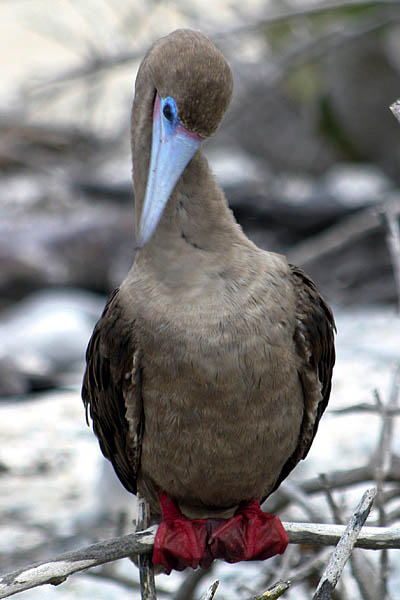
Red-footed booby, Galapagos Islands.
Photo:
David Bate. Luxury Galapagos Cruises.
Day 9: Galapagos Cruise (Genovesa Island)
Genovesa Island (14 sq. km.) is one of the smallest in the archipelago but has a big reputation as "the bird island". It is the best place to see a colony of red-footed boobies, the only one of the three species present in the Galapagos that nests in trees rather than on the ground. A natural formation called Prince Philip's Steps is a bird watcher's delight. The trail leads to a plateau inhabited by red-footed boobies, masked boobies and frigate birds. At the end of this trail are thousands of band-rumped storm petrels at the cliff's edge, where they nest in crevices. Short-eared owls can sometimes be seen here, hunting the storm petrels during daylight hours. Other birds include red-billed tropic birds, Galapagos doves, white-cheeked pintail ducks and many more. Flora includes lava cactus, a yellow-flowered muyuyo forest and palo santo.
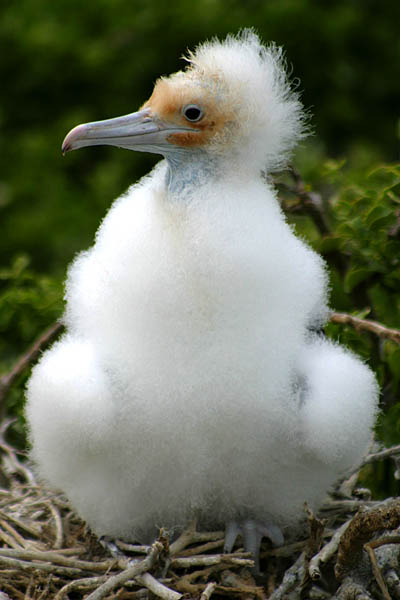
Baby frigate bird, Galapagos Islands.
Photo:
David Bate. Luxury Galapagos Cruises.
Genovesa is a collapsed volcano and ships sail directly into its large breached caldera to anchor at the foot of the steep crater walls. At Darwin Bay Beach, you will observe sea lions and, if snorkeling, hammerhead sharks below you. The island attracts vast numbers of seabirds that come here to nest and breed: red-footed boobies, great frigate birds, swallow-tailed gulls and storm petrels. A trail leads from the coral beach past tidal lagoons, where lava gulls and yellow-crowned night herons are seen, then along the low shrubs populated by frigates and boobies, and eventually to a cliff edge where seabirds soar. Flora includes croton bush, palo santo and saltbrush. Overnight on the Grace.
Swimming Galapagos penguin, Galapagos Islands.
Photo: Bonnie Pelnar. Luxury Galapagos Cruises.
Day 10: Galapagos Cruise (Isabela Island & Fernandina Island)
Isabela Island (4,588 sq. km.) is the largest in the archipelago. It is formed by five young, active volcanoes, of which Volcano Wolf is the highest point in the Galapagos (1,707 meters, or 5,599 feet). On a panga ride along the cliffs of Tagus Cove, look for Galapagos penguins and other sea birds
Fernandina Island (642 sq. km.) is the third largest, youngest and westernmost in the archipelago. Many eruptions have been recorded since 1813, making Fernandina the island most likely to become volcanically active, as it did most recently in May of 2005. After a dry landing at Espinoza Point, you will see the largest colony of marine iguanas in the islands, mingling with Sally light-foot crabs. Other fauna include Galapagos penguins, Galapagos hawks and sea lions. There are also nesting sites of flightless cormorants. These birds have adapted to their environment by perfecting their ability to hunt for food in the ocean -- their wings, tails and feet have evolved for swimming. To see these birds is to witness evolution in action. Among the volcanic formations, observers will note "pa-hoe-hoe", other unusual lava formations and recent lava flows. Flora include brachycereus cacti and mangroves, whose beds extend into the sea, indicating a healthy and thriving ecosystem. Overnight on the Grace.
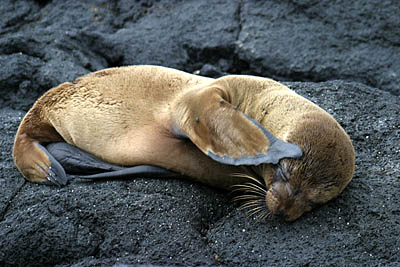
Juvenile seal lion,
Galapagos Islands.
Photo: David Bate. Luxury Galapagos Cruises.
Day 11: Galapagos Cruise (Isabela Island)
On Isabela Island, we'll make a wet landing at Urbina Bay. The bay, at the foot of the Alcedo Volcano, was uplifted from the sea in 1954. Flightless cormorants and pelicans nest along the coast, and sea turtles and manta rays can be seen in the bay. The highlands include large and colorful land iguanas. Other fauna include the largest population of giant tortoises (about 4,000 but difficult to spot), Galapagos hawks, magnificent frigate birds, marine iguanas, hammerhead, white-tipped and Galapagos sharks, eels, groupers and snappers. Continue to Punta Vicente Roca for dinghy sightseeing, snorkeling and scuba diving. Enjoy the high cliffs with tuff-stone, ash and other lava formations; caves; nesting sites for brown noddies and blue-footed boobies; and up-close encounters with sea lions, fur seals and the occasional dolphin. Overnight on the Grace.
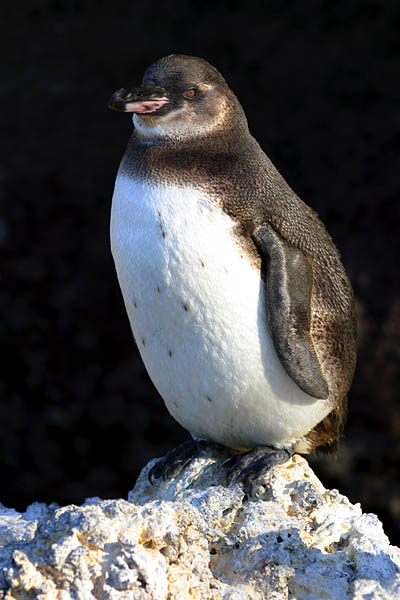
Galapagos penguin, Galapagos Islands.
Photo:
David Bate. Luxury Galapagos Cruises.
Day 12: Galapagos Cruise (Bartolome Island & Santiago Island)
Bartolome Island (1.2 sq. km.), small and moonlike, has one of the most famous sights in the archipelago: Pinnacle Rock. After a dry landing, you will see volcanic formations, including lava bombs, spatter and cinder cones. Hike to the summit for an impressive panorama of Sullivan Bay, including the eroded tuff cone of Pinnacle Rock, and the surrounding islands. The exotic flora of red mangroves, tiquilias and cacti all add to the experience. During the ascent, you will see a large colony of marine iguanas and lava lizards. Snorkeling will give you a chance to cool off and see marine fauna, such as Galapagos penguins, nesting sea turtles (January to March) and white-tipped sharks.
Goldrimmed surgeonfish, Galapagos Islands.
Photo: Bonnie Pelnar. Luxury Galapagos Cruises.
Santiago Island (585 sq. km.) is the fourth largest in the archipelago. The eroded shapes on its black lava shoreline form pools that house a variety of wildlife and are wonderful for snorkeling. Wet landing on the dark-sand beach at Puerto Egas. Most of the landscape is tuff-stone layers and lava flows; the surroundings are prime for observing Darwin's finches, Galapagos doves, Galapagos hawks, hunting herons, great blue herons, lava herons, American oyster catchers and yellow-crowned night herons. You will enjoy the sight of marine iguanas grazing upon algae beds at low tide, sharing space with red Sally light-foot crabs. There is a colony of fur seals swimming in deep pools of cool water, called "grottos". This is an excellent place for swimming and snorkeling in search of octopuses, sea horses, starfishes and other sea life caught in the small tidal pools. In the ocean, you can admire moray eels, hammerhead, white-tip and Galapagos sharks, golden and white-spotted eagle rays, jacks, wahoos, tunas, groupers, red-tailed and dog snappers, sea lions, sea turtles (November to May), black and yellow-black Galapagos corals, sea fans and sponges. Overnight on the Grace.
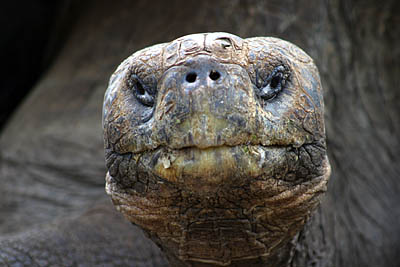
Giant tortoise, Galapagos Islands.
Photo:
David Bate. Luxury Galapagos Cruises.
Day 13: Galapagos Cruise (Santa Cruz Island)
Santa Cruz Island (986 sq. km.) is the second largest in the archipelago and the most populated. Home to the Charles Darwin Research Station, it has many trails, beaches and places for snorkeling. Flora include cacti, saltbrush and mangroves. Fauna include several of the 11 remaining subspecies of giant tortoises, marine iguanas, sharks and various species of waterbirds and landbirds, such as vermillion flycatchers and Darwin's finches. Morning excursion to the Santa Cruz Highlands, where you will observe Los Gemelos, twin volcanic craters, and Cerro Chato. Chances are good for sighting the famous giant tortoises that gave these islands their name. Additionally, you can walk inside the dormant lava tubes.
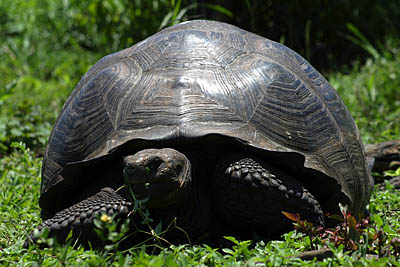
Giant tortoise, Galapagos Islands.
Photo:
David Bate. Luxury Galapagos Cruises.
Afternoon visit to the Charles Darwin Research Station, staffed with international scientists conducting biological research and conservation projects. Here, you can admire giant tortoises, part of the program to breed, rear and reintroduce different subspecies of tortoises back into their natural habitat. Surrounding the station is an impressive giant prickly-pear cactus forest with many land birds. Afterward, some free time to walk around the town of Puerto Ayora. Overnight on the Grace.
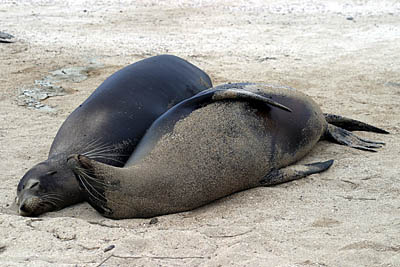
Sea lions, Galapagos Islands.
Photo:
David Bate. Luxury Galapagos Cruises.
Day 14: Galapagos Cruise (Española Island)
Española Island (61 sq. km.) is medium in size and the most southerly. More outlying, it has been able to preserve a high portion of its endemic fauna. Aside from the sea lion colonies, this is one of the most important bird-watching sites. It is unique among the islands in having the only colony of waved albatrosses, which is also the world's largest colony. It has a beautiful white beach, the well-known blowhole and one of the most impressive and varied seabird colonies of the Galapagos.
Marine iguana and lava lizard, Galapagos Islands.
Photo: Kleintours. Luxury Galapagos Cruises.
After a dry landing at Suarez Point, you will learn more about the lava terrain while crossing the inactive lava fields. As soon as you step foot on this island, many species can be spotted close up, such as a large colony of marine iguanas, lava lizards and the colorful Sally light-foot crabs. After a short trek, you will encounter colonies of masked and blue-footed boobies, whose nesting grounds sometimes overlap the trail. You will also find giant frigate birds, red-billed tropic birds and swallow-tailed gulls. After crossing the nesting grounds, you reach the colony of about 15,000 waved albatrosses (April to November). Their mating rituals are a highlight of our visit. Nearing the end of this excursion, you will visit the famous blowhole, where water shoots into the air to almost 23 meters (75 feet).
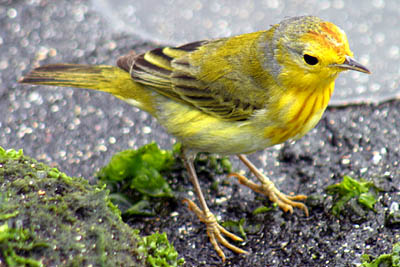
Male yellow warbler,
Galapagos Islands.
Photo: David Bate. Luxury Galapagos Cruises.
Make a wet landing on a white-coral beach on Gardner Bay, amidst a large colony of sea lions. This site has no trails, therefore no hiking, but from this open area you can spot Galapagos hawks, American oyster catchers, Galapagos doves, hood mockingbirds, large cactus ground finches, yellow warblers, lava lizards and marine iguanas. This is a excellent place for swimming and snorkeling -- the best spot is by the rock outcropping that looks like a turtle. Often snorkelers see many of the Galapagos' marine species, such as king angel fish, creole fish, damsel fish, parrot fish, manta rays, white-tipped reef sharks and many more. Overnight on the Grace.
Blue-footed boobies,
Galapagos Islands.
Photo: David Bate. Luxury Galapagos Cruises.
Day 15: Galapagos Cruise (San Cristóbal Island) - Quito
Two hours from San Cristóbal Island is the Sleeping Lion, a magnificent rock that rises 500 feet straight out of the sea. A split in the rock has formed towering walls on either side of a narrow passage through which small vessels can navigate. Continuing to San Cristóbal for a dry landing at Puerto Baquerizo Moreno, we'll have time to walk around town before transferring to the airport for the flight to Quito. Arrival, reception and transfer to your hotel. Dinner at Astrid & Gastón of chef Gastón Acurio. Like the original in Lima, this restaurant incorporates local dishes and ingredients in its sophisticated Criollo cuisine. Overnight in the Casa Gangotena.
Important note: This itinerary is subject to change without notice for various reasons, including but not limited to safety, weather, mechanical breakdown, unforeseen emergencies, and the discretion of the captain, guide, yacht operator and Galapagos National Park.
Magnificent frigate
bird, Galapagos Islands.
Photo: David Bate. Luxury Galapagos Cruises.
Day 16: Quito - Home
Breakfast. Early transfer to the airport for your flight home.
© 2013 Inka's Empire Corporation, Machu Picchu Luxury Tours. All rights reserved.
